Stefanos Tsitsipas: “My goal is to create the best possible memories, on and off the court”
In an exclusive interview for Greek magazine DownTown, Stefanos Tsitsipas says he feels closer than ever to winning a Grand Slam title, explains why he will always be himself and opens up on the girl who has stolen his heart
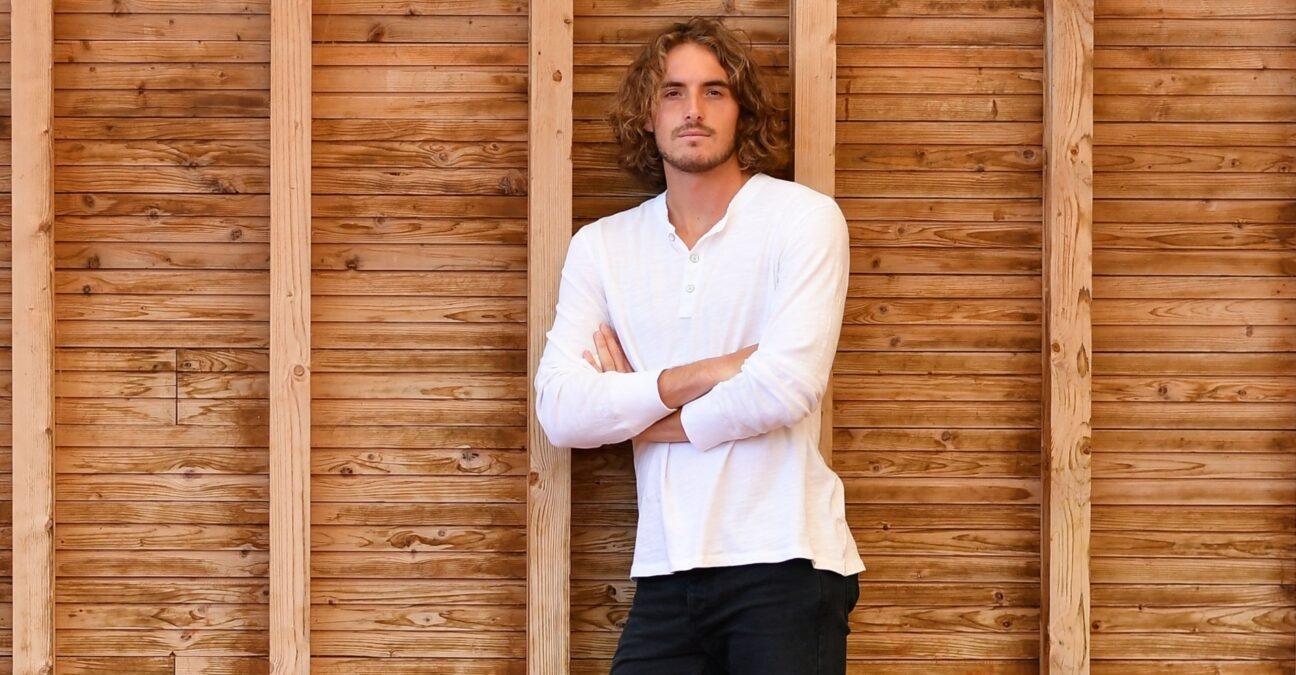 Stefanos Tsitsipas | © Antoine Couvercelle/Panoramic
Stefanos Tsitsipas | © Antoine Couvercelle/Panoramic
After back to back semi-final runs at Roland-Garros and the Australian Open, and winning his first ATP Masters Series title on Sunday in Monte-Carlo, Greece’s Stefanos Tsitsipas is getting closer and closer to his goal of becoming a Grand Slam champion. In a wide-ranging interview, the 22-year-old discusses his hopes, fears and dreams, on and off the court. Below is a translation from the original interview in Greek.
(Editor’s Note: The interview was first published in March 2021)
Stefanos Tsitsipas, now that some days have passed, as you begin to realise what you achieved in Melbourne, how proud are you of your run there?
“Of course, it’s nice to get to the semi-finals of the Australian Open and it’s a valuable thing, but to be honest I aim higher. This semi-final did not bring me as many emotions as the previous ones, but it is an excellent result. I’m getting close, in any case! I am happy that I can reach two consecutive Grand Slam semi-finals, it also helps me in terms of adding ranking points. There are many advantages to it.”
Weren’t you a little unfair to yourself after the match with Daniil Medvedev, when you said that it seemed that you were not ready for a Grand Slam title? What do you think is missing?
“Work! To build up my game so that it’s more complete, without the weaknesses that Medvedev brought out of me on the court, showing that he has the upper hand throughout the match. I have to face these players in order to win a Grand Slam. That day I was not ready, I was not able to go out and stand against him. I know that Medvedev will be an opponent that I will face many times in the future and I will definitely come up against him in important matches or Grand Slams. Therefore, my game has to be built up, so that I can face players of this level. When I can go toe to toe with players like Daniil, who has such a complete game, my own level goes up as well.”
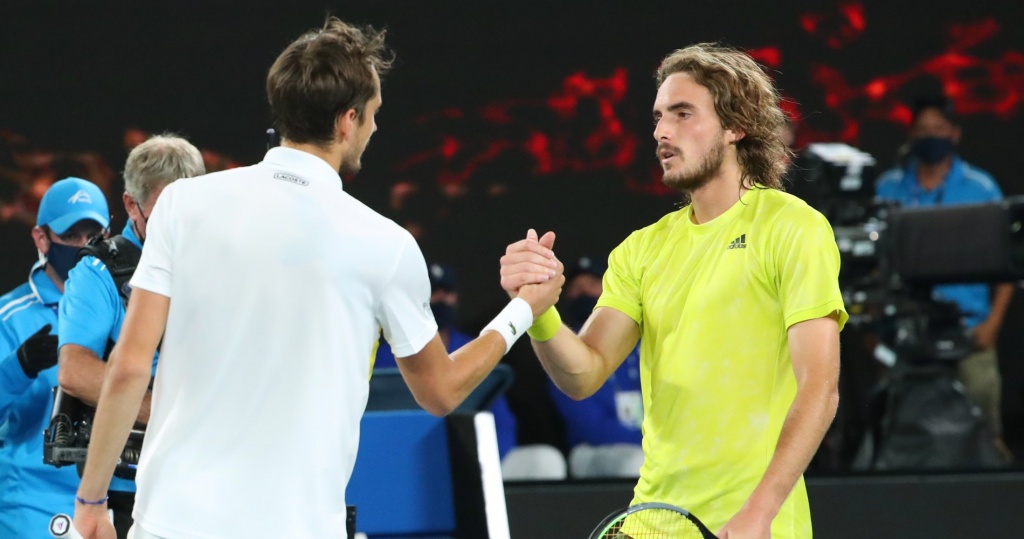
Do you envisage yourself with the trophy whenever you go so deep at a major tournament? Or do you prefer not to take it too far in your head?
“When you reach that point, you always get something like that in your head, it’s hard not to. Because it is the dream of a lifetime and you suddenly realise you are quite close to making that dream come true. For me, winning the Australian Open would mean everything, mainly because my grandfather won the Olympic medal in 1956 in Melbourne (Sergei Salnikov, a Russian footballer), at the football arena that’s 50 metres from Melbourne Park. Unfortunately, I did not have the opportunity to meet him, he passed away at a young age. I wish I had the chance to talk to him! Every match I play there I dedicate to him and, honestly, it pushes me to want to show something more and play well in Melbourne.”
Did you see that Russell Crowe supported you during the semi-final? Did this lift your spirits?
“I did see something on Twitter… It would be different if I had met him in person or if I was a fan of his. For example, 7-8 months ago, I sent a message via Twitter to Ed Westwick, because he starred in a TV series that I liked very much (note: he is referring to Gossip Girl), and I was telling him we could play tennis. He answered me just now, a little late! I’d say that was interesting to see.”
When you go so deep into a Grand Slam or an important tournament, how long does it take you to overcome defeat?
“Some losses definitely hurt more. Having put a lot of work and dedication mainly into the Grand Slams, where more energy and concentration is needed, a loss there is more bitter. They are tournaments of significant value and are distinguished from the rest of the tournaments. That’s where the most points and prize money are, those are the big leagues. We don’t have many opportunities to play such events, only four every year.”
So after the Australian Open, how long did it take you to feel a little better?
“I am still a little upset, to be honest. I haven’t forgotten about it, it still lingers in the back of my mind. The important thing is to move on from this situation and see it as a positive moment in my career, as I try to achieve bigger things day by day. I’ve set some big goals and I know I will have opportunities to do something better next time. All I have to do is go out on the court every day and train so that I can find ways to improve and play these opponents on a more equal footing so that I don’t face such a difficulty in the future.”
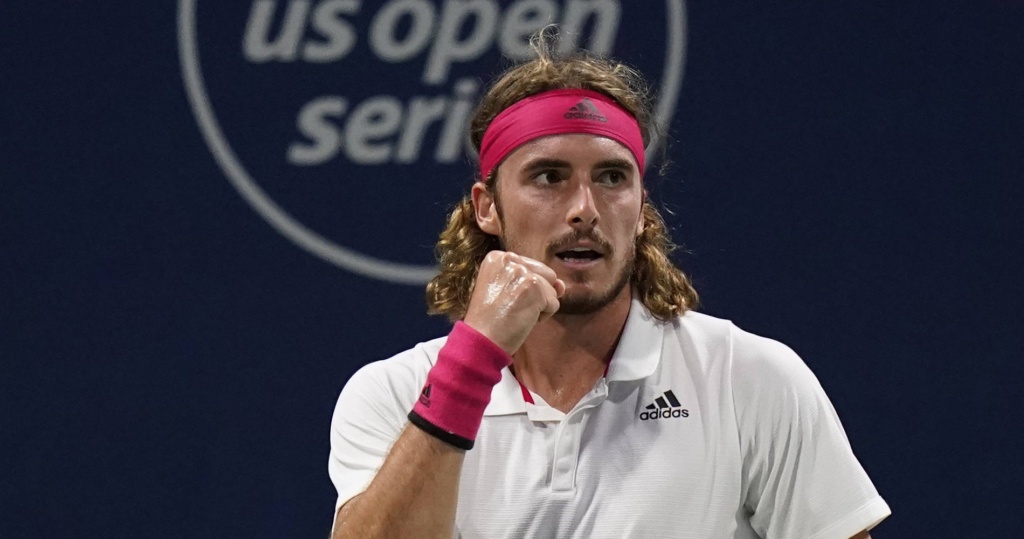
The fact that you met up again with your mother and your siblings, however, helps you move past it more easily…
“Absolutely. Being with them lifts me up a lot, it gives me a different perspective on life. I feel loved and safe when I am near them. The most important thing is that we have a good time, we share beautiful moments. We are very close. When I am near them I forget everything that has happened in the past, I get it out of my head and live in the present, which is something that doesn’t happen to me very often. I get a sense of peace with them!”
All your siblings play tennis, don’t they?
“Yes, and in fact, there’s a bit of a rivalry going on now, because Pavlos is starting to play very well and I don’t know if I will play with him or Petros at the Olympic Games. I would like to play mixed doubles with Elisavet too, but it’s a little too early for her, let’s wait for the next ones!”
Do you think that being inevitably compared to you will be difficult for your siblings?
“I have talked to them about it and told them that everyone has their own destiny. Everyone has their own path and their own way of doing things. Certainly, some things I have accomplished will be brought up and will affect the way people see them. I have told them, however, that what I do on the tour should not affect them, that they each have their own way and that they all have the opportunity to show the world this is our family business! We can all do something similar, we support each other. I am very happy when I see the kids progressing. I want to be close to them as they fulfil their potential, stand by them in their achievements and everything they create along the way. I hope my support will be meaningful and that anything I achieve makes them love the sport even more.”
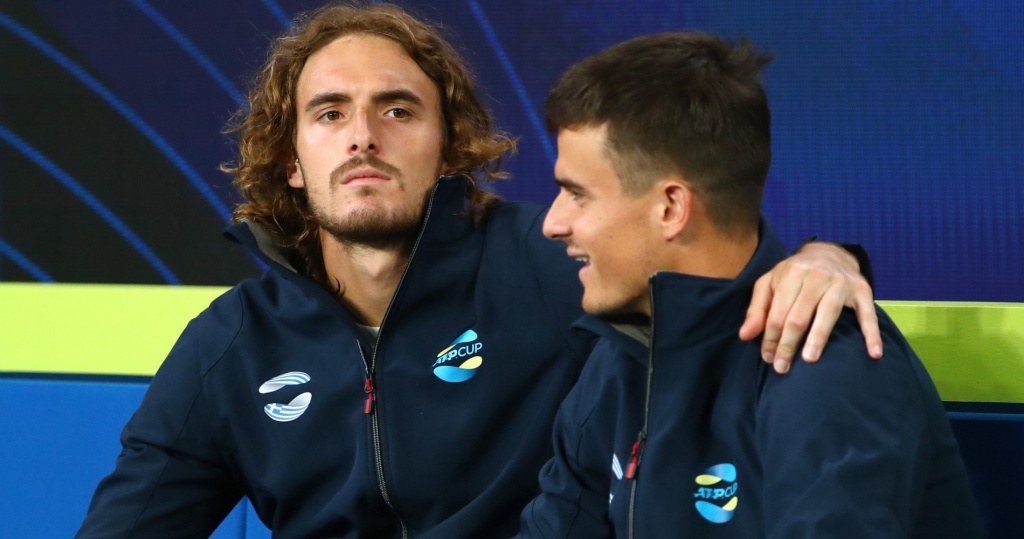
Your father is also your coach, your mother often travels with you. You have said before, however, that sometimes it is not easy to always have your parents by your side. Can you explain that?
“Sometimes I want to be on my own, isolated from others, and not have them around me all the time! I know they love me and their support is a beautiful thing. I really appreciate that we are so tight-knit and they play a major role in my life, for sure. It’s just that it can often become tedious. It’s more to do with habit; when you keep following the same routine and listening to the same things, it can get a little monotonous. Changing it up makes things more spontaneous”.
You are currently in the Mouratoglou Academy near Nice, France with your whole family. When you are alone in Monte Carlo, how do you spend your time?
“At this time, I can’t do much, I stay home. I have my hobbies, though. Now, in fact, I am editing a vlog that will be out tomorrow or the day after tomorrow! And music is a new passion of mine, born during the quarantine in Australia! In general, I am independent; I have no problem being on my own, finding ideas to use my free time off the court, to create, to come up with something that can hopefully have a positive impact on people’s lives.”
Are you informed about what is happening in Greece?
“Lately I have started watching the news more. In the past, I regretted the fact that I didn’t know much about what was happening in my country. But now I’m following the news. I used to not look up anything, not even tennis content, and completely avoided tennis websites during tournaments. I tried to avoid any news because I had heard of players who were affected before playing a match and I didn’t want something like that to happen to me. Rather than seeing something that would affect me, I prefer to avoid it as much as I can. I generally watch the news in English, however, I also like to visit Greek websites, to see what is happening in my country, how things are evolving”.
Have you heard about the allegations that have been made in the sports field, but mainly in the arts and culture field in Greece? [Since January 2021, there have been numerous allegations of verbal, physical and sexual abuse, against sports officials and well-known actors and directors in Greece]
“I have seen, mostly on social media, many people following this path, and raising their voices. All victims and survivors must share their story, what has happened to them and affected them as human beings. I understand them and I fully support them.”
Still on the subject of Greece, have you realised that you are one of the few top tennis players who, after a great victory or tournament run, also talk about their country?
“I carry Greece with me everywhere! I have a special relationship with my country, I am a very loyal ambassador, I feel tremendous pride about helping build a better tomorrow with my tennis. That’s how I see it. With my results and performances, hopefully, I give the impetus and inspiration to young kids to go out and take up tennis. And not just tennis, but also to start playing sports in general, because sport is a wonderful thing, which can create a better tomorrow for the country.”
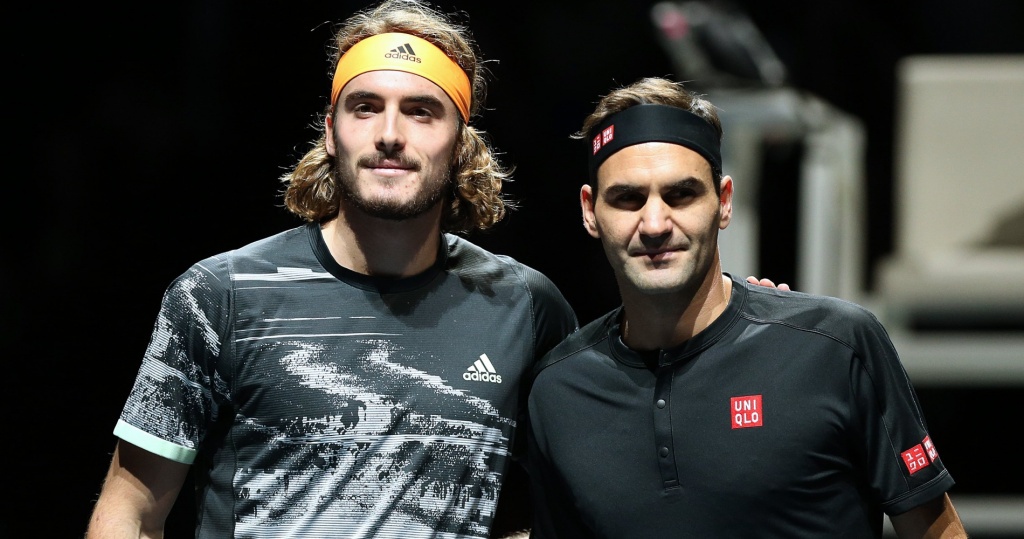
Speaking of inspiration, you are synonymous with tennis in Greece, a role model for young children. They used to idolise Nadal, Federer, now they say “I want to be Tsitsipas”. Is this a nice “responsibility” for you?
“It’s something beautiful to have created myself, with the help of my parents. I remember that as a child I had idols, tennis players I wanted to be like and I was sad that a country like Greece didn’t have a top athlete. We had Konstantinos Economidis, whom I supported when I was young, but we never had a tennis player in the Top 100 or Top 50, someone who would achieve good results in Grand Slams and promote the sport in the country. There was, of course, Marcos Baghdatis, whom I watched and loved very much. He was my favourite, after Federer, of course, who was my idol and the one I wanted to be like. I wished so much for something to be done in Greece, for there to be a good tennis player one day and that probably made me tougher. I wanted to prove that we can play tennis in Greece as well. So, I went out and over the years, I managed to get some results and raise the level of tennis in Greece. It was a big dream of mine and a great need for tennis to come to the forefront.”
What do you miss most about Greece?
“The passion and pride of the Greek people. For me, there is no country in the world that has a culture like Greece. The people are completely different, we’re able to live every day with passion and love. Maybe we don’t realise it yet, but we have a lot of power and we can create amazing things.”
Last year, when you had more time due to the pause in the season, I saw you on vacation in Mykonos with your friends and I thought it was the first time you really had fun as a guy your age. You do what you love, but are there times when you miss the “normal” life?
“No, I don’t miss it. There are times when I wish I had more time off the court to do something creative. To pursue academic education, to learn something new, and develop a new skill. To become more complete as a person. Beyond that, however, tennis has brought me where I am, it has given opportunities not just to me but to my family as well. We moved and now live in the South of France, which gave my younger siblings the chance to start playing tennis, under a general structure that supports that. We suffered a lot financially a few years ago and the sport has helped me unimaginably in that area. We are now comfortable and we no longer need to worry about those things. In addition, tennis has risen in the country and I must emphasise that this was done not only because of me, but also because of Maria Sakkari, who has achieved great things and is also an amazing person. She offers a lot to Greek sports, both as a tennis player and as a person.”
How are you dealing with the publicity? Are you ever bothered by it?
“No, I don’t have a problem with it. If you look at it from the bright side, you find that people support and respect you for what you have accomplished. It’s nice to receive love for something you have created from scratch.”
Novak Djokovic said the other day that over the years he has developed a “thick skin” and can withstand criticism. On the occasion of the comments that were made about you recently, have you also developed a “thick skin” or do you intend to censor yourself in the future?
“I have no reason to develop a thick skin. I’m authentic, I think people understand that. I don’t try to pretend or do something that does not express me and is not part of my personality. There are players who have been criticised for that and I don’t think it’s unfair, especially when it comes from a large part of the audience. I believe people want honesty…”.
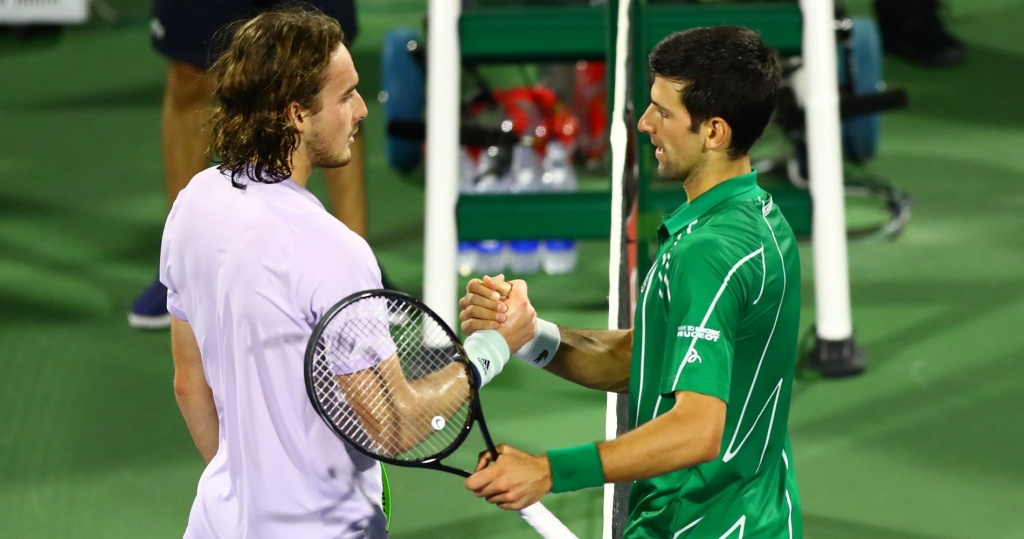
So you will continue to be who you are, and not think that you will have to say something just so you don’t receive negative comments?
“Thank you for mentioning it, because I was thinking about it recently. For me, at some point diplomacy becomes ridiculous. To respond in a disingenuous way, just so you look perfect in the eyes of others, is not something that appeals to me. If I am to say something that I feel very strongly about, I will do so without filtering my thoughts. Such a thing happened recently on Twitter and I don’t regret that. I believe that expressing an idea or opinion is always for the best, although it may make things hard and create conflict with other people. I do not pay any mind to it, I have said before that the way some people react is funny to me, because my intentions are good and I’m not trying to antagonise anyone. For me, being authentic is very important. Many athletes in recent years have taken diplomacy to an outrageous level and it has started to get boring. It’s always the same answers, the same headlines. The field must remain interesting, there must be some moments of truth.”
Can you tell me a few words about the girl, Theodora (Petalas)? How did you two meet?
“We have known each other for three years, through family friends. We first met in New York and I liked her very much, but I was shy then and did not express my feelings. But two years ago, again in New York, I asked her out on a date. I asked her to go to Brooklyn to snap some photos and I think she liked that. I did take some photos, which to this day are my favourites! She is someone who has supported me a lot, she’s brought me great balance and I have a lot of feelings for her. I think she feels the same! Our relationship is something very special. The fact that we understand each other and have things in common, personality-wise, helps a lot”.
Is distance an obstacle?
“It’s a little difficult for us because she lives in London, but thankfully it hasn’t brought us to extremes! She comes to some tournaments to support me and so we can spend some time together. She is my best friend! We talk every day, for two or three years now. I don’t think a day has gone by that we haven’t spoken, and our chemistry is very good. She also plays tennis, and when I play with her, it is my favourite moment on the court! It brings a huge smile to my face.”
What are your dreams for the future? And don’t just tell me the obvious, like reaching No. 1, or Grand Slam titles. How, say, do you imagine yourself at 40?
“No one knows what will happen until then, but I would like a career like Roger Federer. I don’t mean what he has achieved, I mean I would like to have a career as long as his. My goal is to create the best possible memories and moments on and off the court. My hope is that when I look back to those moments, they will bring me joy and I will feel that I gave it my best, that I had the opportunity to learn something new and to mature as an athlete, every day.”
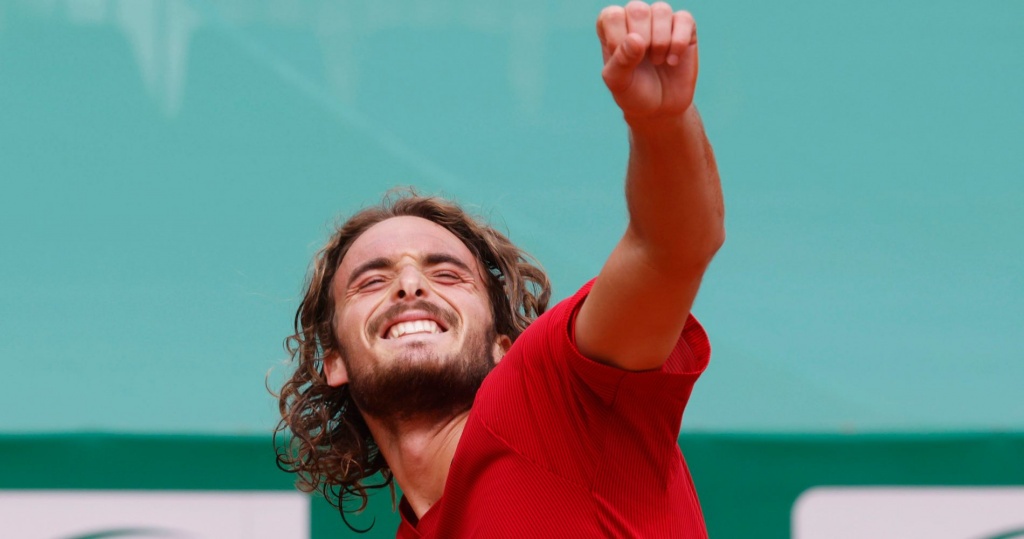
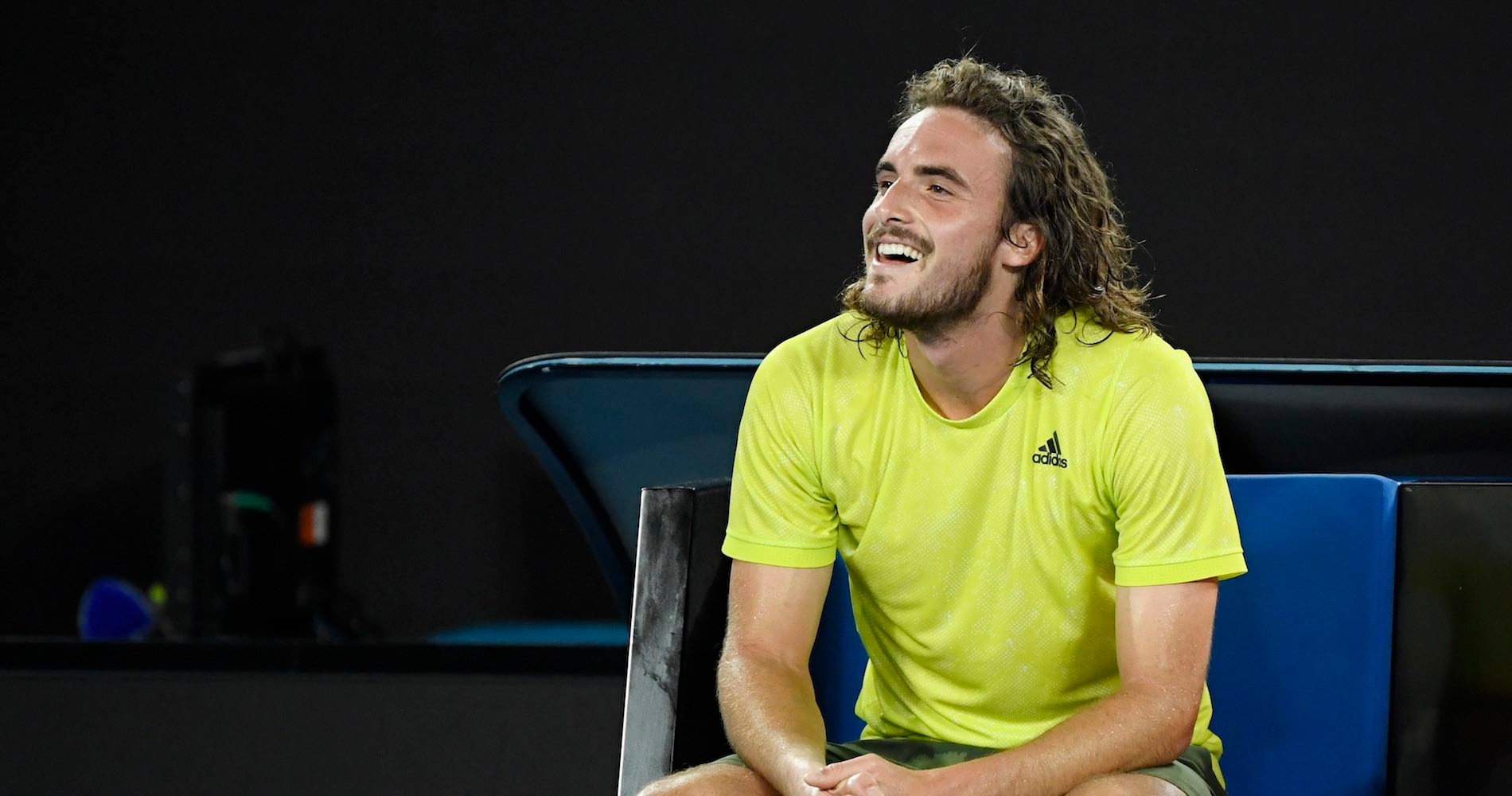
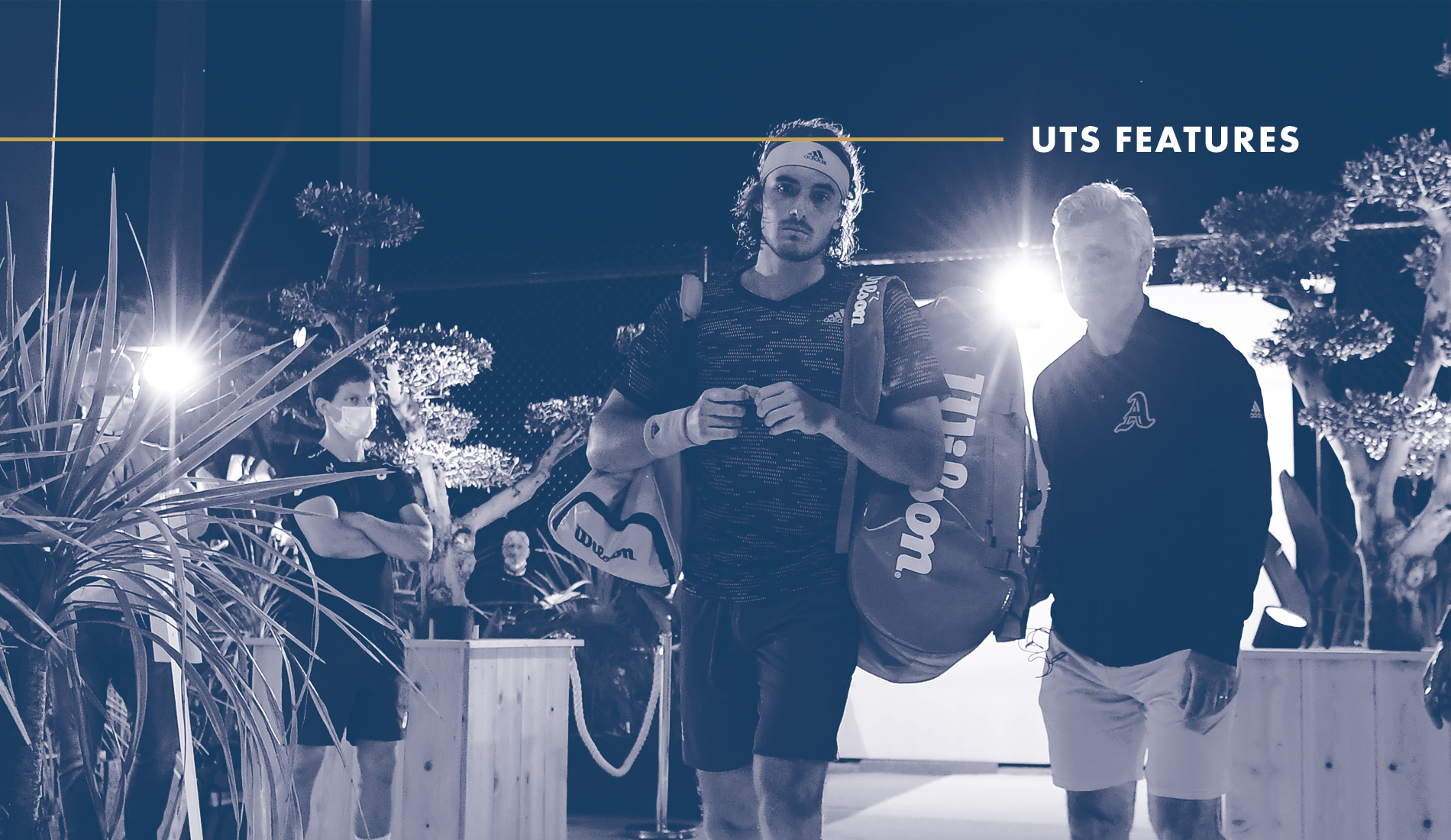
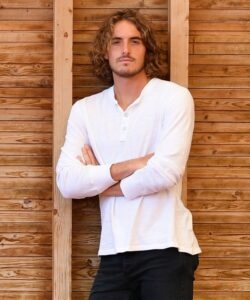
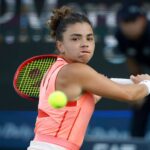
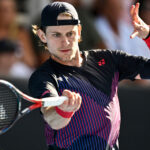

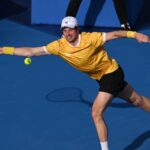
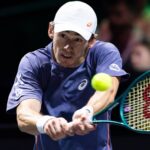
I love watching Tisipas play..He plays with stragegy as well, which is important in tennis. I’m wishing him continued success in achieving all his goals in life. He’s an adorable young man..